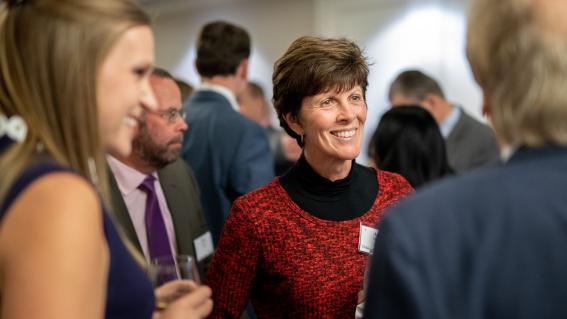UMass Amherst Names Anne P. Massey New Isenberg Dean
June 25, 2019
“We are living in an age of acceleration with the rate of technological change increasing. While the future of work calls for technical skills, it also demands an understanding of the human and ethical sides of management and leadership. This reality poses new opportunities for teaching and learning, research, and outreach”, says Anne Massey. “We must ask ourselves what new programs and platforms will support learners over their careers? And, how can we advance faculty research and collaborations that help develop solutions to real problems?”

Isenberg’s new dean, who joins the school officially in August 2019, has focused on aligning academic programs with the technical, social and cultural changes happening outside campus walls throughout her career, and she’s excited to join a school where multi-disciplinary programs, industry partnerships, and student-led team projects are already the norm. “Among many opportunities, there is great potential for us to collaborate with other campus units as we seek to meet the needs of learners and the organizations that hire them. We also have opportunities to grow into new areas such as professional development via the Mount Ida Campus”, Massey says.
She joins Isenberg from the Wisconsin School of Business at the University of Wisconsin, where she was professor and Ruth L. Nelson Chair of Business. While there, she led efforts to develop a new MS degree in Design + Innovation, involving the schools of business, human ecology, and engineering. Leading new initiatives, particularly those involving cross-disciplinary collaborations, began for Massey during her 22-year tenure at the Kelley School of Business at Indiana University Bloomington. At IU, as co-chair of the Intelligent Systems Engineering Program, she led efforts with faculty from business, informatics and computing, arts and sciences, public and environmental affairs, and law to implement a new undergraduate engineering degree, the first of its kind at IU Bloomington. At IU, Massey was also the co-founder of the Center of Excellence for Women in Technology, an interdisciplinary initiative that promotes the participation, empowerment, and achievement of women in technology. “There is a big difference between having tech skills and working in tech fields”, says Massey. “Today, it is hard to think of an industry that isn’t searching for tech-savvy talent. The center reflects my interest in offering ways to develop the skills and importantly mindsets needed in the workforce of today and the future.”
She also focuses on collaborations with industry. Massey spent six years during her time at Kelley serving as executive director for the Information Management Affiliates, an industry-university cooperative involving more than 20 businesses and nonprofits.
Her primary research focuses on innovation processes and strategies, and the role of technology as an enabler of collaborative work. Her research has garnered federal, foundation and industry funding and her articles have been published in leading academic journals. Massey earned her Bachelor of Science degree in management, a Master of Science degree in industrial engineering, and a Ph.D. in decision sciences and engineering systems from Rensselaer Polytechnic Institute.
“We’re in a critical time for higher education and, more specifically, business education,” she says. “I am truly excited to join such a forward-looking school and university. With a strong portfolio of programs and top-quality students, faculty known for their scholarship and teaching, dedicated staff, a collegial culture that welcomes innovation, and a supportive network of alumni and friends, I believe we have the raw materials necessary to take advantage of the opportunities in front of us.” Massey continued, “I want to get off to a good start by learning as much as I can about the school and university. Developing insights into our culture and building relationships with stakeholders will be essential to not only understanding our most promising opportunities, but also what it will take to realize their potential.”